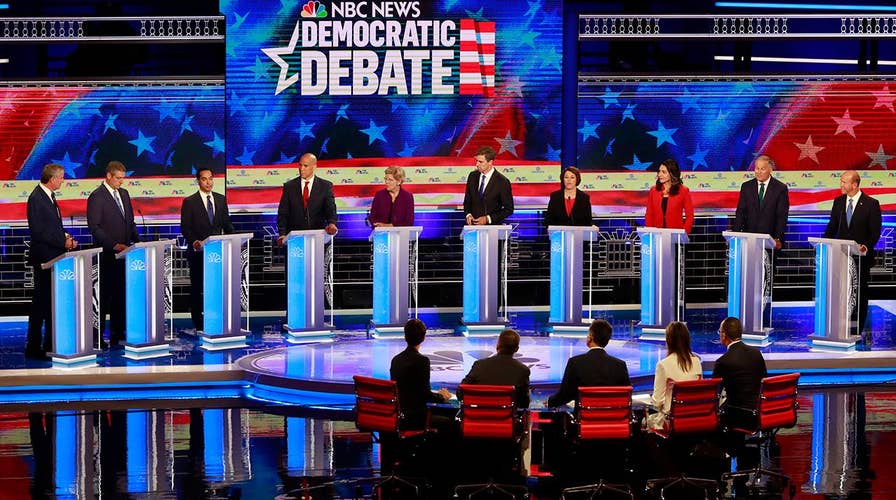2020 Democratic presidential candidates back health care for illegal immigrants
Former New Mexico Republican Governor Susana Martinez says America has become a magnet for illegal immigration with promises of free health care.
Health care dominated the two Democratic presidential debates last week. Among the most dramatic moments was when moderator Lester Holt asked the candidates to raise their hands if they supported outlawing private insurance and forcing everyone onto a new government-run, "Medicare-for-all" plan.
During each debate, only two candidates — Sen. Elizabeth Warren and Mayor Bill de Blasio on night one, and Sens. Bernie Sanders and Kamala Harris on night two — said they would. Hours later, Harris claimed she didn't understand the question and walked back her support.
But at least the hand-raisers are honest about wanting to kick people off their health insurance. The other 16 envision a much greater role for government in our nation's health care system as well, one that at the very least includes a government-sponsored "public option" health plan.
That may sound like a moderate alternative to "Medicare-for-all." But it's just a slow-walk to single-payer. And it's one of my three Democratic debate deceptions on health care.
Canadians may have a statutory right to health care. But given the limited supply of care available to them, it's a right they have trouble exercising.
The first false claim: a public option means private insurance is here to stay.
On night one, Maryland Congressman John Delaney challenged "Medicare-for-all's" proponents by pointing out that "100 million Americans say they like their private health insurance." He, and several of his counterparts on the stage, propose creating a public option to compete against private insurers.
It would be competition in name only. The public option wouldn't have to cover its costs. So it could set artificially low premiums.
Further, most public option proposals envision adopting something like Medicare's reimbursement rates for doctors and hospitals. Those rates are about 40 percent less than what private insurance pays.
Providers would respond by raising prices for private insurers even more, to compensate for the losses they'd take on those covered by the public option. Insurers would pass those hikes along to their customers in the form of higher premiums.
Consumers are rational. If private premiums skyrocket, they'll jump to the public option and its artificially low premiums. Eventually, the public option would be the only option.
One study estimates that after one year with a public option, 119 million people would lose their private coverage.
The second false claim: "Medicare-for-all" is affordable.
Of course, Warren and Sanders don't want to wait for the death of private insurance — they want to bring it about right away. Warren declared that politicians who declare "Medicare-for-all" infeasible are "really telling you ... they just won't fight for it."
They'll have trouble lining up support for something that will cost the federal government more than $32 trillion over ten years. Rank-and-file Americans are unlikely to get behind a bill that would levy a new 4 percent tax on every single household and a new 7.5 percent tax on employers' payrolls, among other levies.
Even doubling current income and corporate tax receipts would be insufficient to cover the cost of "Medicare-for-all."
The third false claim: Health care is a human right.
Warren and Sanders ground their case for "Medicare-for-all" in the language of rights.
On night one, Warren declared, "Health care is a basic human right, and I will fight for basic human rights." Sanders said much the same on night two: "Health care, in my view, is a human right and we have got to pass a 'Medicare-for-all,' single-payer system."
But declaring something a right does not make it so. Single-payer advocates are really calling for health care to be free at the point of access. Doing so could stoke infinite demand for care. There's simply no way to create an unlimited supply to meet that demand.
In fact, Medicare-for-all's proposed pay cuts will drive down the supply of care. Many doctors will quit rather than accept cut-rate pay. Young people, particularly the nation’s best and brightest, will decline to pursue careers in medicine. And hospitals running on already thin profit margins, such as those in rural areas, will close.
Long waits for necessary treatment will be the result. Under Canada's single-payer system, patients wait a median of nearly 20 weeks for treatment from a specialist after referral from a general practitioner.
Many cutting-edge treatments are simply unavailable because the government refuses to pay for them. Canadians have access to less than half of new medicines brought to market between 2011 and 2018. U.S. patients had access to nearly 90 percent.
CLICK HERE TO GET THE FOX NEWS APP
Canadians may have a statutory right to health care. But given the limited supply of care available to them, it's a right they have trouble exercising. The same would be true under "Medicare-for-all" in the United States.
The next Democratic debate is at the end of July in Detroit. Unfortunately, it's a safe bet that they'll be peddling these deceptions then, too.

